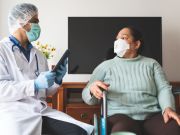- Judge Blocks Cuts to $11 Billion in Public Health Funding
- Common Chemicals in Plastics May Harm Baby Brain Development
- Trump Administration Orders More Cuts to CDC Budget
- FDA Delays Final Approval of Novavax COVID Vaccine
- Medicaid Expansion Protected Americans During COVID-19 Pandemic
- Antidepressants Linked To Sudden Cardiac Death
- Discrimination Dramatically Increases Risk for Depression, Anxiety
- New Blood Test Can Diagnose, Track Alzheimer’s Disease
- Bedsores More Likely In Short-Staffed Hospitals Leaning On Nurse OT, Travel Nurses
- Lifestyle Changes Boost Longevity For Cancer Survivors
Gynecological Cancers Not a Risk for Severe COVID-19: Study

Despite rampant fears that cancer patients are at higher risk of having severe cases of COVID-19, a new study suggests gynecologic cancers do not boost the chances of hospitalization or death.
“Our study should be reassuring for women with gynecologic cancers who are worried that having cancer increases their risk of becoming seriously ill if they go to the hospital because of COVID-19,” said lead investigator Olivia Lara, an oncology fellow at NYU Langone’s Perlmutter Cancer Center.
For the study, Lara’s team reviewed the medical records of 121 women, aged 51 to 63, being treated simultaneously for gynecologic cancers and COVID-19 in New York City between March and April.
The results, published online July 31 in the journal Cancer, revealed that these women had similar hospitalization rates and death as those who only had COVID-19.
More than half of the study patients required hospitalization, and among those hospitalized one-quarter died, amounting to a 14% death rate.
The death rate among this sample is comparable to the 21% death rate identified in another study, which included 5,700 hospitalized COVID-19 patients in the city, the study authors noted.
The study could potentially alter the theory that cancer patients face worse odds when infected with COVID-19.
A full 75% of the women with gynecological cancer experienced only a mild form of the disease, according to the report.
The women’s risk of dying from COVID-19 did not increase even if they had late-stage cancer, cancer surgery or high-dose chemotherapy, the study authors said in a New York University news release.
Still, one risk factor related to cancer treatment seemed to increase the odds of death.
Women receiving immunotherapy — treatment that uses a person’s own immune system to fight cancer — were three times more likely to die than women who received standard cancer treatments such as radiation, surgery or chemotherapy.
But only eight out of the 121 participants included in the study were treated with immunotherapy, prompting the study authors to stress that the sample was too small to make any conclusions based on this finding.
The results do underscore the importance of receiving cancer screenings and treatments, despite COVID-19 fears.
“The basic rules of cancer care have not changed during the pandemic,” study senior investigator Dr. Bhavana Pothuri said in the news release. “Early detection, screening and care lead to more people surviving what remains a leading cause of death among American women.”
More information
There’s more about coronavirus and cancer at the American Cancer Society.
Source: HealthDay
Copyright © 2025 HealthDay. All rights reserved.









